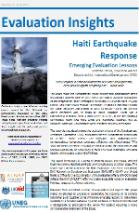Evaluation of development programmes
Evaluation Insights: Building a Coherent Approach to Evaluating the Haiti Earthquake Response
Following the 2010 earthquake in Haiti, the DAC Network on Development Evaluation worked to promote a collaborative approach to evaluate reconstruction and recovery efforts, bringing together Haitian and international partners to support learning and accountability. This effort was led by the Observatoire / Haiti Evaluation and Learning Support Office, supporting national stakeholders to engage with evaluations and build capacities for better results management in the long run. The evaluation support function was run by the organisation URD, with support from ECHO and the evaluation departments of Ireland and the U.K.
The OECD DAC EVALNET also worked with the United Nations Evaluation Group (UNEG), and the Active Learning Network for Accountability and Performance in Humanitarian Action (ALNAP) to produce a shared Context Analysis and Evaluation Framework and create an online Haiti Learning and Accountability Portal. One year after the earthquake, a light synthesis of Lessons from the Haiti Earthquake Repsonse was published to share emerging insights.
|
|
Evaluation Insights: Lessons from the Haiti Earthquake Repsonse
Evaluation Insights are informal working papers that present emerging findings and policy messages from evaluations. This note draws on available evaluations of the Haiti earthquake in January 2010 to highlight emerging lessons for those working to support a sustainable recovery in Haiti and future emergency responses elsewhere.
|
||
Key resources on the Haiti earthquake response
- Inter-Agency Real-Time Evaluation of the Humanitarian Response to the Earthquake in Haiti
- Haiti Earthquake Response: Context Analysis and Evaluation Framework
- Haiti Learning and Accountability Portal (ALNAP)
- Inter agency Real Time Evaluation - three months after (Aug 2010) en francais
- Achievements, Challenges and Lessons To Be Learned (July 2010)
-
Overview of "Building a coherent approcah to evaluating the Haiti earthquake response"
-
Evaluation reports on Haiti, earthquake recovery and humanitarian aid can be found on the ALNAP Haiti Learning and Accountability Portal or DEReC.
-
Note presented at the 12th Meeting of the DAC Evaluation Network in June 2011 on Supporting evaluations of the Haiti Disaster Response
Background
Following the Haiti Earthquake in January 2010, and the large-scale relief and recovery efforts that have been mounted, a number of evaluative efforts were initiated by diverse stakeholders.
One of the lessons from the Indian Ocean Tsunami events is that high accountability pressure led to a number of fragmented, individual evaluations. This type of fragmentation not only results in duplication and wasted effort, but can overwhelm local systems and undercut opportunities for learning about broader impacts. The responsibility for ensuring a more co-ordinated and useful evaluation effort lies partly with evaluation managers. But it also depends on demands made at the policy level. DAC members and other development partners are asked to respond to questions from parliaments, media and the public about results achieved. When translating this accountability need into demand for evaluations, policy makers need to be aware of the opportunities for collaboration and help promote co-ordinated and joint evaluation approaches.
Haiti Evaluation Task Force
The joint Haiti Evaluation Task Force was launched in May 2010 at a meeting in London. The meeting was co-hosted by the OECD DAC Evaluation Network, ALNAP, and UNEG and brought together key players involved in evaluative efforts in Haiti with operational and policy-level decision makers. The aim of the meeting was to draw on experiences from evaluations of past disaster responses, establish a shared understanding of evaluation aims and priorities, and start working collectively towards a coherent and cost-efficient process for commissioning and undertaking evaluations. Please visit the meeting website for more information.
Context Analysis
This joint context analysis synthesises background material, research and evaluations for those involved in assessing the earthquake response. Shared context analyses and evaluation frameworks can help reduce duplication and support joint thinking and work. Using a common basis for analysis also makes it easier to share and compare findings from evaluations carried out by different agencies.
--> Haiti Earthquake Response: Context Analysis and Evaluation Framework
Evaluation Support Office in Haiti
The Task Force looked at how best to support evaluation in Haiti and developed a Concept Note (see attachment three) on how a support office might strengthen evaluation capacities and improve coordination and use of evaluation findings.
--> Read the mission report
Related Documents
